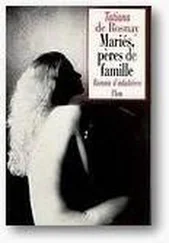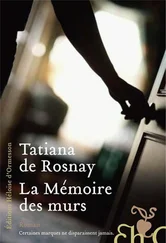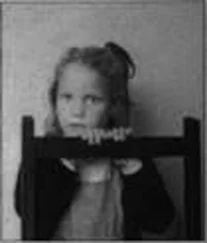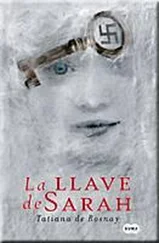They walked down the narrow street, the police ordering them on. The girl glanced at the strangers watching them from windows, balconies, doors, from the sidewalk. Most of them had empty, uncompassionate faces. They looked on, not saying a word. They don’t care, thought the girl. They don’t care what is being done to us, where we are being taken to. One man laughed, pointing at them. He was holding a child by the hand. The child was laughing, too. Why, thought the girl, why? Do we look funny, with our stinking, wretched clothes? Is that why they are laughing? What is so funny? How can they laugh, how can they be so cruel? She wanted to spit at them, to scream at them.
A middle-aged woman crossed the street and quickly pressed something into her hand. It was a small roll of soft bread. The woman was shooed off by a policeman. The girl just had enough time to see her return to the other side of the street. The woman had said, “You poor little girl. May God have pity.” What was God doing, thought the girl, dully. Had God given up on them? Was he punishing them for something she did not know about? Her parents were not religious, although she knew they believed in God. They had not bought her up in the traditional religious fashion, like Armelle had been by her parents, respecting all the rites. The girl wondered whether this was not their punishment. Their punishment for not practicing their religion well enough.
She handed the bread to her father. He told her to eat it. She wolfed it down, too fast. It nearly choked her.
They were taken in the same town buses to a railway station overlooking the river. She didn’t know which station it was. She had never been there before. She had rarely left Paris in all her ten years. When she saw the train, she felt panic overcome her. No, she couldn’t leave, she had to stay, she had to stay because of her brother, she had promised to come back to save him. She tugged on her father’s sleeve, whispering her brother’s name. Her father looked down at her.
“There is nothing we can do,” he said with helpless finality. “Nothing.”
She thought of the clever boy who had escaped, the one who had gotten away. Anger swept through her. Why was her father being so weak, so gutless? Did he not care about his son? Did he not care about his little boy? Why didn’t he have the courage to run away? How could he just stand there and be led into a train, like a sheep? How could he just stand there and not break away, and not run back to the apartment, and the boy, and to freedom? Why didn’t he take the key from her and run away?
Her father looked at her, and she knew he read all the thoughts in her head. He told her very calmly that they were in great danger. He did not know where they were being taken. He did not know what was going to happen to them. But he did know that if he tried to escape now, he would be killed. Shot down, instantly, in front of her, in front of her mother. And if that happened, that would be the end. She and her mother would be alone. He had to stay with them, to protect them.
The girl listened. He had never used this voice with her before. It was the voice she had overheard during those worrying, secret conversations. She tried to understand. She tried not to let her face show her anguish. But her brother… It was her fault! She was the one who had told him to stay in the cupboard. It was all her fault. He could have been here with them now. He could have been here, holding her very hand, if it hadn’t been for her.
She began to cry, burning tears that scalded her eyes, her cheeks.
“I didn’t know!” she sobbed. “Papa, I didn’t know, I thought we were coming back, I thought he’d be safe.” Then she looked up at him, fury and pain in her voice, and pummeled her little fists against his chest. “You never told me, Papa, you never explained, you never told me about the danger, never! Why? You thought I was too small to understand, didn’t you? You wanted to protect me? Is that what you were trying to do?”
Her father’s face. She could no longer look at it. He gazed down at her with such despair, such sadness. Her tears washed the image of his face away. She cried into her palms, alone. Her father did not touch her. In those awful, lonely minutes, the girl understood. She was no longer a happy little ten-year-old girl. She was someone much older. Nothing would ever be the same again. For her. For her family. For her brother.
She exploded one last time, tugging on her father’s arm with a violence that was new to her.
“He is going to die! He will die!”
“We are all in danger,” he replied at last. “You and me, your mother, your brother, Eva and her sons, and all these people. Everyone here. I am here with you. And we are with your brother. He is in our prayers, in our hearts.”
Before she could answer, they were pushed into a train, a train that had no seats, just bare wagons. A covered cattle train. It smelled rank and dirty. Standing near the doors, the girl looked out to the gray, dusty station.
On a nearby platform, a family was waiting for another train. The father, the mother, and two children. The mother was pretty, her hair done up in a fancy bun. They were probably off on vacation. There was a girl, just her age. She had a pretty, lilac dress. Her hair was clean, her shoes shiny.
The two girls gazed at each other from across the platform. The pretty, fancy-haired mother was looking, too. The girl in the train knew her tearful face was black with filth, her hair greasy. But she did not bow her head with shame. She stood straight, her chin high. She wiped away the tears.
And when the doors were heaved closed, when the train gave a jolt, wheels clanging and groaning, she peered out through a tiny chink in the metal. She never stopped looking at the little girl. She watched until the figure in the lilac dress completely disappeared.

I HAD NEVER BEEN FOND of the fifteenth arrondissement. Probably because of the monstrous surge of high-rise modern buildings that disfigured the banks of the Seine just next to the Eiffel Tower, and that I had never been able to get used to, although they were built in the early seventies, a long while before I arrived in Paris. But when I turned up at the rue Nélaton with Bamber, where the Vélodrome d’Hiver once stood, I thought to myself I liked this area of Paris even less.
“God-awful street,” muttered Bamber. He took a couple of shots with his camera.
The rue Nélaton was dark and silent. It obviously never got much sunshine. On one side, bourgeois stone buildings built in the late nineteenth century. On the other, where the Vélodrome d’Hiver used to be, a large brownish construction, typically early sixties, hideous in both color and proportion. MINISTÈRE DE L’INTERIEUR, read the sign above the revolving glass doors.
“Odd place to build governmental offices,” remarked Bamber. “Don’t you think?”
Bamber had only found a couple of existing photographs of the Vel’ d’Hiv’. I held one of them in my hand. Big black lettering read: VEL’ D’HIV’ against a pale façade. A huge door. A cluster of buses parked along the sidewalk, and the tops of people’s heads. Probably taken from a window across the street on the morning of the roundup.
We looked for a plaque, for something that mentioned what had happened here, but could not find it.
“I can’t believe there is nothing,” I said.
We finally found it on the boulevard de Grenelle, just around the corner. A smallish sign. Rather humble. I wondered if anyone ever glanced at it. It read:
On July 16 and 17, 1942, 13,152 Jews were arrested in Paris and the suburbs, deported and assassinated at Auschwitz. In the Vélodrome d’Hiver that once stood on this spot, 1,129 men, 2,916 women, and 4,115 children were packed here in inhuman conditions by the government of the Vichy police, by order of the Nazi occupant. May those who tried to save them be thanked. Passerby, never forget!
Читать дальше












